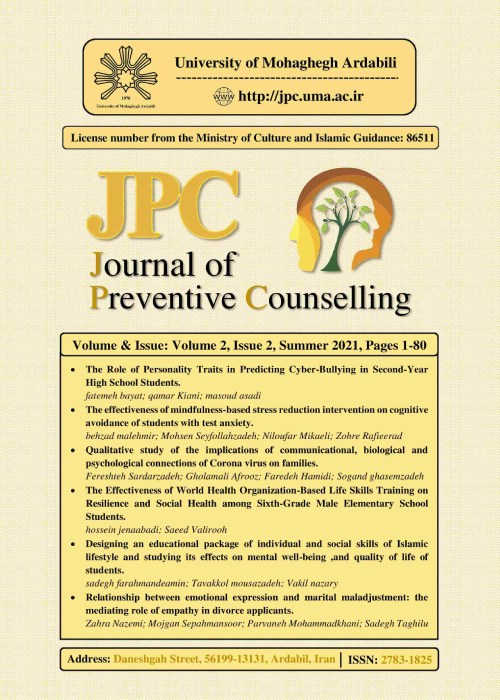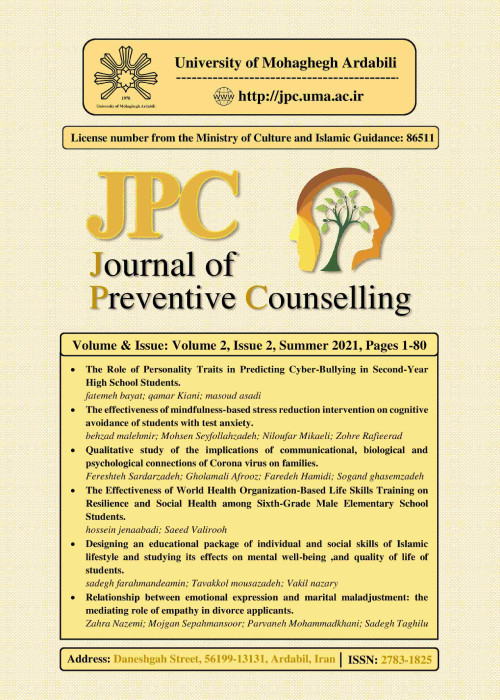فهرست مطالب

Journal of Preventive Counselling
Volume:3 Issue: 4, Dec 2022
- تاریخ انتشار: 1401/11/24
- تعداد عناوین: 6
-
-
Pages 1-20
The present research was conducted with the aim of developing an educational model for women to cope with maternal stress based on the coping methods of satisfied women and its effectiveness in their cognitive emotion regulation. The research design was mixed methods. The participants in the qualitative phase of the study included the women (living in Tehran in 2021), who were satisfied with their lives and had at least one 6-year old child. In the first phase, after the initial screening, from among 51 women, 11 women whose level of satisfaction with life was above the mean were selected through purposive sampling method. Using in-depth interviews, an educational model for women to cope with their maternal stress was prepared in 10 sessions. In the second phase, the validity of the educational model was confirmed using Content Validity Ratio (CVR) index of Lawshe (1975). In the third phase, the population and the statistical sample were selected, and using the multi-baseline design, the educational model was implemented. Through available sampling method, the mothers who met the inclusion criteria were provided with Cognitive Emotion Regulation Questionnaire; they were asked to fill out the questionnaire. Finally, from among the 14 mothers who were examined, three mothers who both had the inclusion criteria and were volunteers participated in the study and were trained in 10 sessions. Findings The results showed that the educational model of women's coping with maternal stress based on the coping methods of satisfied women was effective in their cognitive emotion regulation.
Keywords: maternal stress, cognitive emotion regulation, women, multi-baseline design -
Pages 21-37AimA female teacher plays multiple roles in her life as a teacher, mother, wife, etc., and her occupational dissatisfaction can override her other roles. The present study investigated the issues and challenges of female contract teachers.MethodA qualitative approach and grounded theory design were adopted in this research. The target population included all the female contract teachers of Ashkezar in Iran, and 12 participants were selected by theoretical sampling in the academic year 2021-2022. Semi-structured interviews, continued until the theoretical saturation, were used to collect data, which were then analyzed by open, axial, and selective coding and categorization.ResultsThe analysis led to the development of 27 sub- and 11 main categories within a paradigmatic model. The main categories encompassed causal conditions (cultural and organizational factors), core category (dissatisfaction), strategies (behavioral changes and thinking about economic alternatives), intervening environmental conditions (familial-cultural and economic-political environment), contextual conditions (financial-software and inhibitory contexts), and consequences (teacher-centered and educational consequences).DiscussionThe results indicated that cultural and organizational causes engender teacher dissatisfaction. In the face of these conditions, teachers change their behaviors and think about economic alternatives, leading to teacher-centered and educational consequences.ConclusionFemale contract teachers faced many challenges that negatively influenced their efficiency and motivation and made them feel disappointed. These challenges brought about some sensible and insensible issues and intricacies. In general, this study suggests considering approaches to motivate and involve in making decisions and put the guidance and consultation of female contract teachers on the agenda.Keywords: Contractual employment, Female Teachers, Grounded-Theory Research, Qualitative Approach, Teachers' issues
-
Pages 38-49Due to the great importance of health in the nursing profession, it can be potentially stressful for them. The aim of this study was to compare emotional intelligence, general health and physical health in nurses working in psychiatric wards and other wards of hospitals. The present study was descriptive and causal-comparative. The statistical population of the present study was all nurses in Ardabil in the first half of the year 1400 that 50 nurses working in psychiatric wards and 50 nurses were selected by simple random sampling. Bar-Ann's Emotional Intelligence Questionnaire (1980), Goldberg & Hiller's General Health Questionnaire (1972) and Scott and Clovi's Physical Health Questionnaire (2003) were used to collect data. Data were analyzed using descriptive statistics and multivariate analysis of variance (MANOVA). The results showed a statistically significant difference between the two groups of nurses in the psychiatric ward and other wards in the variables of emotional intelligence (F = 9.85and P<0.01), general health (F = 24.22 and P<0.01) and physical health (F = 14.77 and P <0.01). Therefore, according to the results of the present study, it is suggested that education of emotional intelligence, general health and physical health components be included in the in-service training program of nursing students both as in-service training courses for employed nurses and as a course unit. Efficiency and effectiveness of the level of nursing services and empowerment of nursing students, increase the satisfaction of patients and their families from nursing services and also improve the level of community health.Keywords: Emotional intelligence, General Health, Physical Health, Nurse
-
Pages 50-70his study sets out to examine a comparison of the effectiveness of couple therapy, based on schema therapy and affective reconstruction therapy on marital relationship quality of infertile couples. This quasi-experimental study was conducted based on a pre-test, post-test, control group design with follow-up. The statistical population of this study included all infertile couples referred to the Royan Institute for Biotechnology in Tehran in 2018-2019. The sample consisted of 30 couples who were selected via a purposeful sampling method and were randomly assigned to two experimental groups and one control group (n=5 couples in each group). Subsequently, the first experimental group underwent schema therapy(Young, & Brown, 2005) for 12 sessions, the second experimental group received affective reconstruction therapy (Snyder, & Mitchell, 2008) during 15 sixty-minute sessions(twice a week), while the control group was placed on the waiting list and received their psychological treatment process differently from the two approaches studied in this study. The Marital Relationship Quality was conducted on three groups in all phases of pre-testing and post-testing and follow-up. A multivariate covariance analysis and a one-way covariance analysis were conducted using SPSS24 software. As evidenced by the obtained results, schema therapy and affective reconstruction therapy had a significant effect on the marital relationship quality of infertile couples (P<0.05). According to the obtained results, it seems that the use of both schema therapy and affective reconstruction therapy to improve marital relationship quality of infertile couples is effective and it is recommended to be used as a therapeutic approach.Keywords: Schema therapy, Affective Reconstruction, marital relationship quality, Infertile Couples
-
Pages 71-82The purpose of this study is to explore whether training psychological capital is effective on mental health and subjective well-being in adolescence. A quasi-experimental design was used with pre-test and post-test data evaluations, comparing an experimental group with a control group. In this study, the statistical population included adolescent girls with problematic mental health (age 13–15) referred to an Arian psychological clinic from April to June 2021 in Borujerd, Iran. The study included twenty-three adolescents selected through a purposive sampling method and randomly divided into two groups, experimental (n=12) and control (n=11). To collect data, mental health and subjective well-being questionnaires were administered. For the experimental group, Psychological capital intervention was administered in ten sessions of 90 minutes every two weeks while the control group received no treatment. MANOVA in SPSS software version 23 was used for data analysis. Results suggest that the Psychological Capital intervention had positive effects on mental health (P <0.001, F = 18.88) and subjective well-being (P<0.001, F= 16.36) in adolescent girls with problematic mental health. This study reveals that PsyCap intervention is effective at improving mental health and subjective well-being. This study provides encouraging new evidence for the efficacy of psychological capital (PsyCap).Keywords: Psychological Capital Intervention (PCI), mental health, subjective well-being, adolescence
-
Pages 83-93The purpose of this study was to evaluate the effectiveness of time perspective therapy on adolescent suicidal ideation in the outbreak of Covid-19. This research was quasi-experimental (pre-test, post-test and follow-up with control group). The statistical population of this study consisted of all girls’ students from 7th to 12th grades in Rasht city, Iran. The statistical sample consisted of 24 adolescents with suicidal ideation who were randomly assigned in experimental and control groups. Beck's Suicidal Ideation Scale (BSIS) was used to collect data. The experimental group received time perspective therapy (Sword et al., 2014) for 8 sessions, one 90-minute session per week. Analysis of variance with repeated measure and Tukey post-hoc tests were used for data analysis. The results showed that time perspective therapy was effective in reducing suicidal ideation of girls’ adolescents (p<0.05). Based on the results, time perspective therapy has an effect on suicidal ideation and time perspective therapy is suggested to reduce adolescent suicidal ideation in conditions such as covid-19 pandemic.Keywords: adolescent, COVID-19, Suicidal ideation, time perspective therapy


